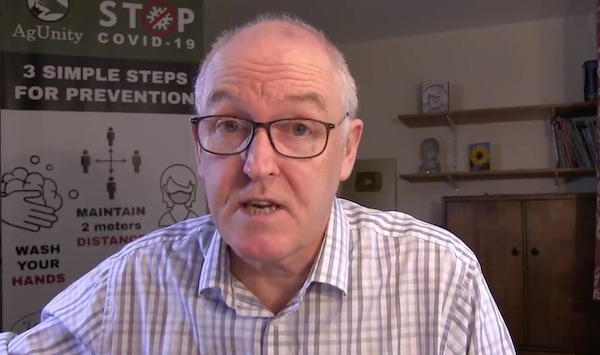COVID-19
Ivermectin and Molnupiravir: How does the widely used drug compare to the new drug in treating Covid-19

John Campbell has been making videos to teach common people about the world of medicine for over 20 years. After a career of teaching nurses, Campbell discovered a real need for medical information described in a way most anyone can understand. In the nearly two years that John Campbell has been making videos explaining information about covid his viewership has exploded, commonly reaching hundreds of thousands and even millions of views. People around the world have expressed a thirst for knowledge about the latest information around covid from a trusted source.
You can see a list of John Campbell’s videos here.
A number of weeks ago, John Campbell released this presentation. It’s a comparison of a drug that has been widely used but also widely criticized in treating covid around the world, with a new drug which is expected to soon gain widespread approval. Despite the success of Ivermectin, an inexplicable wave of opposition has resulted in a miserable failure by public health and politicians to adopt this extremely safe and effective treatment. While that’s extremely frustrating, it does appear Molnupiravir is on the fast track to approval. Molnupiravir may be slightly less effective and astronomically more expensive than Ivermectin, it should be effective enough to reduce the fear surrounding the virus that has killed so many. With the reduction of fear citizens should be able to expect restrictions around masks, and movement, and businesses to become voluntary. A successful treatment should also allow governments to back off mandates around vaccinations in favour of a voluntary approach. Could the end of the divisive restrictions finally be on the horizon? This video contains some of the most exciting and promising news to come since the beginning of our covid disaster.
Here’s a look at Ivermectin compared with Molnupiravir. Hopefully our public health officials and political decision makers are paying attention.
COVID-19
Randy Hillier wins appeal in Charter challenge to Covid lockdowns

Former Ontario Member of Provincial Parliament Randy Hillier in the Ontario Legislature (Photo credit: The Canadian Press/Chris Young)
The Justice Centre for Constitutional Freedoms is pleased that the Ontario Court of Appeal has accepted former Ontario MPP Randy Hillier’s appeal and overturned a lower court ruling that had dismissed his Charter challenge to Ontario’s lockdown regulations. These regulations were in effect during the 2021 Covid lockdowns.
The decision was released by the Ontario Court of Appeal on Monday, April 7, 2025.
In the spring of 2021, Mr. Hillier attended peaceful protests in Kemptville and Cornwall, Ontario. He spoke about the importance of the Canadian Charter of Rights and Freedoms and the harms caused by the province’s lockdown regulations. The government’s health orders made it illegal for even two people to assemble together outdoors: a blatant and unjustified restriction of the Charter section 2(c) freedom of peaceful assembly. Other provinces allowed five or ten or more people to gather together outdoors.
Mr. Hillier has outstanding charges in Kemptville, Cornwall, Peterborough, Belleville, and Smith Falls. Prosecutors in those jurisdictions are waiting to see the results of this Charter challenge. Mr. Hillier has faced similar charges in many other jurisdictions across Ontario, but these have been stayed or withdrawn at the request of the respective prosecutors.
Mr. Hillier defended himself against the tickets that were issued to him for violating lockdown restrictions by arguing that these lockdown regulations were unjustified violations of Charter section 2(c), which protects freedom of peaceful assembly.
Four expert reports were filed to support Mr. Hillier’s case, including the report of Dr. Kevin Bardosh, which extensively reviewed the many ways in which lockdowns harmed Canadians. They showed alarming mental health deterioration during the pandemic among Canadians, including psychological distress, insomnia, depression, fatigue, suicidal ideation, self-harm, anxiety disorders and deteriorating life satisfaction, caused in no small part by prolonged lockdowns. Many peer-reviewed studies show that mental health continued to decline in 2021 compared to 2020. The expert report also provides abundant data about other lockdown harms, including drug overdoses, a rise in obesity, unemployment, and the destruction of small businesses, which were prevented from competing with big-box stores.
Justice Joseph Callaghan dismissed that challenge in a ruling issued November 22, 2023. Notably, Justice Callaghan did not reference any evidence of lockdown harms that Dr. Bardosh had provided to the court. Without reasons, the court declared that Dr. Bardosh is “not a public health expert” and then ignored the abundant evidence of lockdown harms.
Lawyers for Mr. Hillier filed a Notice of Appeal with the Ontario Court of Appeal on December 22, 2023.
Mr. Hillier’s Appeal argued that, among other things, Justice Callaghan erred in applying the Oakes test. As the Notice of Appeal states, Justice Callaghan “fail[ed] to recognize that a complete ban on Charter protected activity is subject to a more onerous test for demonstrable justification at the minimal impairment and proportionality branches of Oakes.”
The Oakes test was developed by the Supreme Court of Canada in the 1986 case R. v. Oakes, as a way to evaluate if an infringement of a Charter right can be demonstrably justified in a free and democratic society. That test has three parts. The first requires that the means be rationally connected to the objective. The second is that it should cause minimal impairment to the right. The third is proportionality, in the sense that the objective of impairing the right must be sufficiently important.
Mr. Hillier’s Appeal focused on the second part of the Oakes test: whether the regulations were minimally impairing of Mr. Hillier’s 2(c) freedom where they effectively banned all peaceful protest.
Justice Centre President John Carpay stated, “It is refreshing to see a court do its job of protecting our Charter freedoms, by holding government to a high standard. There was no science behind Ontario’s total ban on all outdoor protests.”
COVID-19
Massive new study links COVID jabs to higher risk of myocarditis, stroke, artery disease

From LifeSiteNews
A new meta-analysis covering 85 million people found more evidence linking the COVID-19 vaccines to stroke, coronary artery disease, myocardial infarction, and arrhythmia.
A new meta-analysis covering 85 million people has found more evidence linking the COVID-19 vaccines to serious medical harms, although the authors appear to downplay the significance of their own findings in what one analyst calls the price of publication.
The study, published in the International Journal of Preventive Medicine, analyzes the findings of 15 previous studies covering almost 46 million vaccinated individuals and 40 unvaccinated ones. The effects overwhelmingly concern the Pfizer and AstraZeneca shots.
“Bayesian meta-analysis revealed a link between vaccines and CAD risk (OR, 1.70; 95% CrI: 1.11-2.57), particularly after BNT162b2 (OR, 1.64; 95% CrI: 1.06-2.55) and second dose (OR, 3.44; 95% CrI: 1.99-5.98),” the paper summarizes. “No increased risk of heart attack, arrhythmia, or stroke was observed post-COVID-19 vaccination. As the only noteworthy point, a protective effect on stroke (OR, 0.19; 95% CrI: 0.10-0.39) and myocardial infarction (OR, 0.003; 95% CrI: 0.001-0.006) was observed after the third dose of the vaccine.”
However, digging into the study’s actual data reveals a 70% increased overall risk of coronary artery disease (CAD); a 286% increased risk of myocardial infarction (MI) after second doses; a 240% increased risk of stroke after a first dose; and a 199% increased risk of arrhythmia after a first dose.
The authors conclude that the “association of COVID-19 vaccination with the risk of coronary artery disease should be considered in future vaccine technologies for the next pandemic,” but curiously argue that “(w)hile acknowledging potential side effects, our findings support the overall safety of the COVID-19 vaccine concerning cardiovascular complications such as myocardial infarction, stroke, and arrhythmia.”
Commenting on the study, McCullough Foundation epidemiologist Nicolas Hulscher argued that the discrepancy between the “actual data” and “how the authors spin it for publication” was to be expected, as “most will say anything to get the paper published” given the pervading biases among the medical establishment.
The data adds to a significant body of evidence behind ambivalence to the COVID-19 vaccines.
The federal Vaccine Adverse Event Reporting System (VAERS) reports 38,541 deaths, 220,494 hospitalizations, 22,247 heart attacks, and 28,908 myocarditis and pericarditis cases as of March 28, among other ailments. U.S. Centers for Disease Control & Prevention (CDC) researchers have recognized a “high verification rate of reports of myocarditis to VAERS after mRNA-based COVID-19 vaccination,” leading to the conclusion that “under-reporting is more likely” than over-reporting.
An analysis of 99 million people across eight countries published in the journal Vaccine “observed significantly higher risks of myocarditis following the first, second and third doses” of mRNA-based COVID vaccines, as well as signs of increased risk of “pericarditis, Guillain-Barré syndrome, and cerebral venous sinus thrombosis,” and other “potential safety signals that require further investigation.” In April 2024, the CDC was forced to release by court order 780,000 previously undisclosed reports of serious adverse reactions, and a study out of Japan found “statistically significant increases” in cancer deaths after third doses of mRNA-based COVID-19 vaccines, and offered several theories for a causal link.
In January, a long-awaited Florida grand jury report on the COVID vaccine manufacturers found that while only a miniscule percentage of the millions of vaccinations resulted in serious harm based on the data it had access to, such events do occur, and there are “profound and serious issues” in pharmaceutical companies’ review process, including reluctance to share what evidence of adverse events they did find.
All eyes are currently on President Donald Trump and his health team, helmed by Robert F. Kennedy Jr. as Secretary of Health and Human Services. As one of the country’s most vocal critics of the COVID establishment and vaccines more generally, his nomination brought hope that the second Trump administration will take a critical reassessment of the shots that the returning president has previously embraced, although most of Kennedy’s comments since joining Trump have focused on other issues, such as conventional vaccines and harmful food additives, and during confirmation hearings he called Operation Warp Speed an “extraordinary accomplishment.”
Trump has given mixed signals as to the prospects of reconsidering the shots and has nominated both critics and defenders of establishment COVID measures for a number of administration roles.
-

 2025 Federal Election2 days ago
2025 Federal Election2 days agoHarper Endorses Poilievre at Historic Edmonton Rally: “This Crisis Was Made in Canada”
-

 John Stossel23 hours ago
John Stossel23 hours agoGovernment Gambling Hypocrisy: Bad Odds and No Competition
-

 Bruce Dowbiggin2 days ago
Bruce Dowbiggin2 days agoBettman Gives Rogers Keys To The Empire. Nothing Will Change
-

 2025 Federal Election2 days ago
2025 Federal Election2 days agoPoilievre Will Bring in ‘One and Done’ Resource Approvals, and Ten Specific Projects Including LNG Canada Phase II
-

 2025 Federal Election2 days ago
2025 Federal Election2 days agoElection Security Briefing Confirms CCP-Linked Operation Boosted Carney
-

 conflict2 days ago
conflict2 days agoZelensky Alleges Chinese Nationals Fighting for Russia, Calls for Global Response
-

 2025 Federal Election2 days ago
2025 Federal Election2 days agoAn In-Depth Campaign Trail “Interview” With Pierre Poilievre
-

 Alberta23 hours ago
Alberta23 hours agoAlberta’s embrace of activity-based funding is great news for patients









